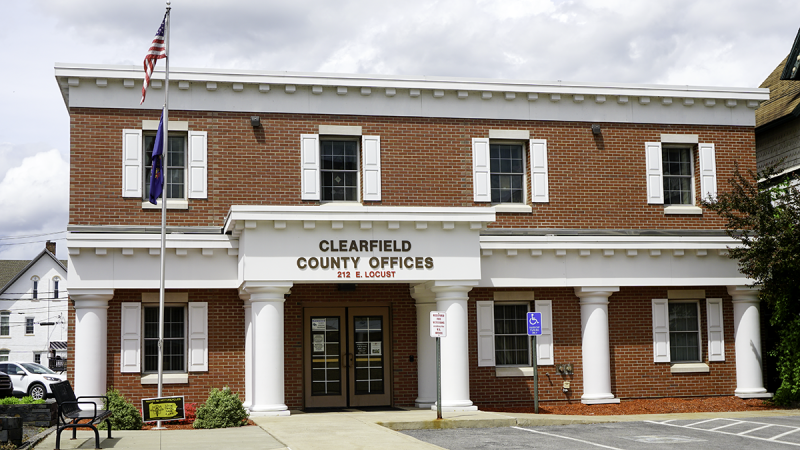CLEARFIELD – The recent speculation that the Clearfield County Commissioners have “hidden money” was dispelled at Tuesday’s board meeting.
It arose during public comment Sept. 26 when Dennis Biancuzzo—candidate for Clearfield County commissioner—claimed the county has amassed an exorbitant surplus of at least $10.7 million dollars since 2017.
During public comment Tuesday, Biancuzzo was joined by Tony Yankevich and Joseph Marino, both of Clearfield.
Yankevich said the county—in his opinion—was “hiding” five years worth of surpluses in its general fund including $2.8 million from 2019, $4.8 million from 2020 and $2.8 million from 2021.
He went on to claim the county had a fund balance of $4.2 million in 2017, $3.3 million in 2018 and $5.9 million in 2019.
Yankevich said it climbed to just over $10 million by 2020 and the county ended 2021 with a fund balance of $11.4 million.
When Yankevich was notified of the expiry of his public comment, Marino rose to speak and said he wanted to yield his time to Yankevich but was advised that wasn’t permitted.
Instead the county had Cory Johnson of Zelenkofske Axelrod LLC, its accounting firm, address the speculation, with him first noting that Biancuzzo and Yankevich were dealing with unaudited numbers.
In 2017 he reported the county had an unrestricted/unassigned fund balance of a mere $350,000, which was very concerning and resulted in one of his first conversations with that board of commissioners.
“That’s historically low numbers,” commented Johnson. “…That’s one lawsuit, that’s one tragedy, that’s one stroke of bad luck from a complete disaster.”
Ever since, he said it’s been an ongoing effort of the county to grow its fund balance, which should at the very least be 15 to 20 percent of total expenditures.
According to audited numbers presented by Johnson, the county’s unrestricted/unassigned fund balance grew to $1.7 million in 2018 and fell to $1.65 million in 2019.
In the years since, the county was awarded COVID relief through the Coronavirus Aid, Relief and Economic Security (CARES) Act and American Rescue Plan Act (ARPA).
But Johnson said there’s one stipulation that comes along with these funds—the county can’t use surpluses generated by these funds to lower taxes.
“It’s written right in the law, and so a lot of these [relief] funds went out to citizens, non-profits and capital projects.”
Johnson also noted that historically, the county’s had very little debt until its recent jail renovation project.
He said the county wasn’t “hiding” money and used to have a separate fund for an operating reserve, but that’s been included in the general fund since 2017.
“We audit everything” within the county’s federal tax identification number, Johnson said, adding that “no one here is in cahoots to cook the books.”
When Yankevich accused Johnson of presenting misinformation, Commissioners John Sobel, board chairman, and Dave Glass cut him off, saying he already had his turn to speak.
Yankevich later questioned what the county’s unrestricted fund balance was at the end of 2021.
Johnson explained the audit hasn’t been completed yet, but he could tell him “it’s not $10 million dollars.”
When Yankevich continued to question Johnson, Sobel reminded him “it’s public comment, not public debate.”
Johnson said the 2021 audit got delayed because he lost some very key staff, and that he was working to have the 2021 and 2022 audits finished up simultaneously.
Controller Rob Edwards said he wished Yankevich would have come to him privately rather than making it a public spectacle.
Glass agreed, saying the commissioners are an “open book” and willing to meet anyone at anytime to help them understand the county’s finances.
“But, do you want to have a conversation, or do you want to throw bombs? That’s the question.”
Glass said after the last meeting, he called the accounting firm, talked to Edwards and also talked with his fellow commissioners internally.
“And, we couldn’t find any evidence—whatsoever—of hidden funds before I was here in 2020—in 2017, 2018, 2019—all this time you’re talking about.
“There’s no evidence of it.”
From 2018-2022, there was so little cash on hand, Glass said, the county had to take out loans to pay bills and make payroll, which costs the taxpayers interest money.
“If there’s money sitting around, this board would not have done that. But there was no money and he (Johnson) says the exact same thing.”
Glass also said when he was running for office, he was very critical of the county for being so “cash poor.”
“There’s nothing wrong with having a healthy fund balance because whatever that number is—at the end of the year—it has to carry us through until roughly April 1.
“If we don’t have four-, five- six-or even eight-million dollars on hand, we can’t make that work. We just can’t … so having that on 12/31 is a healthy position for us to be in.
“It should be the goal.”
